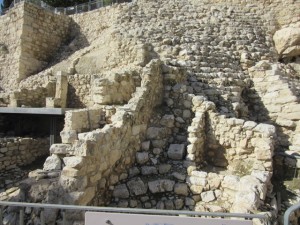

Last month my wife and I had our first visit to Jerusalem. We took these pictures at the site of the foundations of the wall of the original city of David, destroyed by the Babylonian army in 586 B.C. The sign continues to read, “The floors of the houses were covered by a thick layer of ash. Beneath the heap of rubble in one room, Yigal Shiloh uncovered Babylonian and Israelite arrowheads and remnants of a charred piece of wooden furniture bearing a palmette design. The wood was imported to Syria, attesting to the high status of the residents of these houses.”
What does the destruction of Jerusalem in 586 BC have to do with healing the brokenhearted? God had pleaded with His people through the prophet Jeremiah decades earlier: “Amend your ways and your deeds, and I will let you dwell in this place. Do not trust in deceptive words, saying ‘This is the temple of the Lord, the temple of the Lord, the temple of the Lord.’ For if you truly amend your ways and your deeds, if you truly practice justice between a man and his neighbor, if you do not oppress the alien, the orphan, or the widow, and do not shed innocent blood in this place, nor walk after other gods to your own ruin, then I will let you dwell in this place, in the land that I gave to your fathers forever and ever.” (Jeremiah 7:4-7).
God cares for the brokenhearted and He wants His people to do the same. He commanded them to practice justice, care for the orphan and widow, and treat foreigners fairly. Because this is God’s heartbeat, their obedient faith was far more important than God’s keeping the city and temple intact. Jeremiah weeps over and over again for the choices they make to serve their own appetites and gods, rather than follow God’s ways. In 596 BC the warnings had gone on long enough; the entire city was destroyed and the people either killed or deported to Babylon.
Today God still cares for the brokenhearted; as Christ’s followers justice for the weak, care of the marginalized and fairness to foreigners are not an option, but express Christ’s heart for the nations. All of us must be involved, not just those of us in medicine and healing professions. But Christians in medicine have a unique opportunity to bring words and works of healing to the brokenhearted. How are you involved? How might you engage with God’s heart this way in 2015?
Here’s a warning for us. The people of God refuse to listen to Jeremiah. He said (Jeremiah 8:11) “they heal the brokenness of the daughter of My people superficially, saying ‘Peace, peace,’ but there is no peace.” The leaders of that day promised peace but the healing was superficial. There was no inner change. Real peace and real healing go hand in hand, and man cannot manufacture them; they are a gift from God. Am I willing for God to break my heart for others in distress, or will I cling to superficial words of peace and superficial healing? My challenge is that I am committed to bring healing to the brokenhearted, but in order to do that my own broken heart must be healed.
When Jeremiah himself understands that His people will continue in their rebellion, he says, “Harvest is past, summer is ended, and we are not saved.” (Jeremiah 8:20). In other words, Babylon will definitely come (as they later did in fact). He laments, “Is there no balm in Gilead? Is there no physician there?” In fact Gilead was a town east of the Jordan river known for its healing balm and arts. But there would be no final healing for a nation that will not receive God’s medicine. God will not heal superficially.
Many of us are engaged in some way in Christian mission or medicine. Do we heal with superficial words and actions, or are we attempting to bring deep healing to the wounds of the nations? As we align with God’s purposes in Christ, harvest is not past, summer is not ended. There is a balm in Gilead, found in the sweet person of Christ, and available for healing of the nations. First however, we must allow Him to apply the healing balm to our own broken souls. How about yours?


Leave a Reply